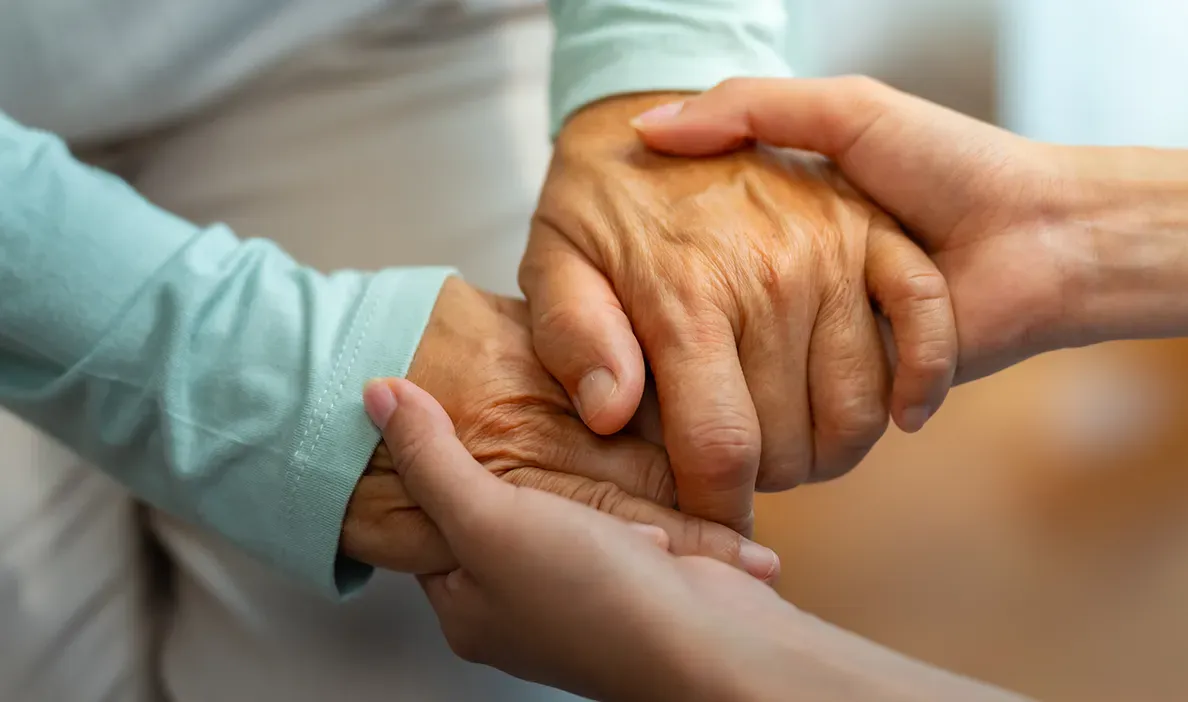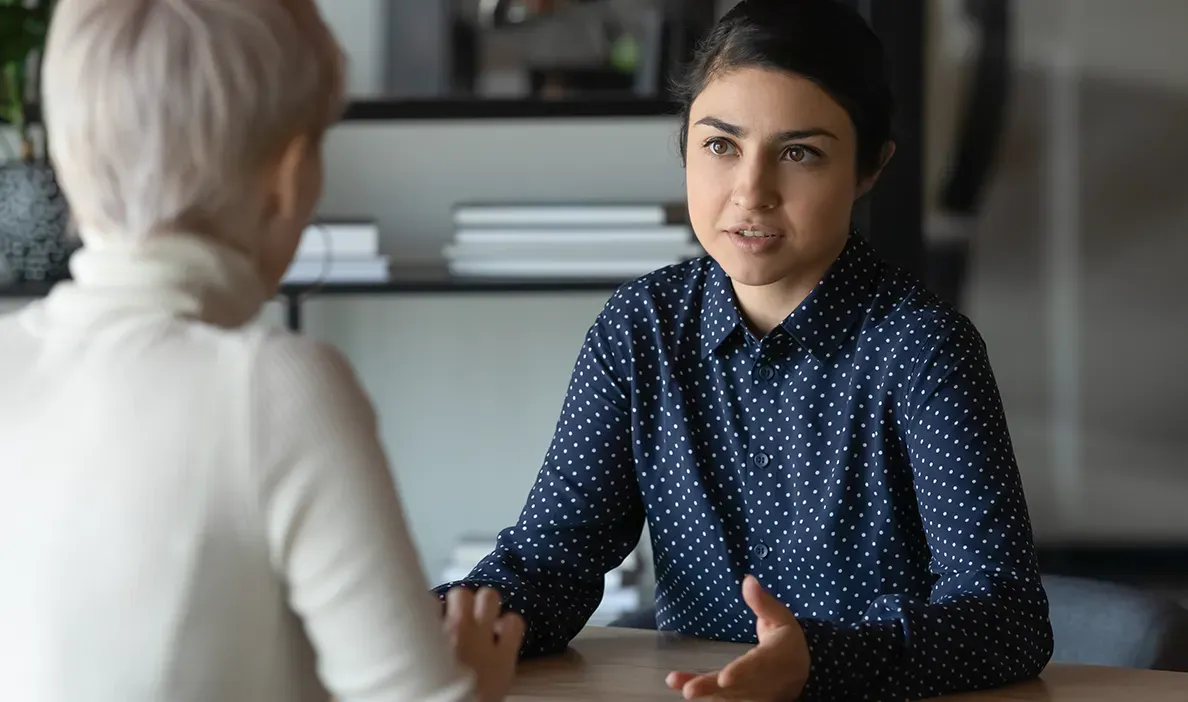We understand how difficult it can be when someone close to you has been diagnosed with cancer. You may have lots of questions and be feeling lots of different emotions.
Becoming a caregiver for a loved one might not be where you ever imagined you’d be. It’s a tough position to be in, but with the right support you can help your loved one through this challenging journey.1 Here, we aim to help you in providing the best care you can.
Stay organised
From when they are diagnosed, throughout their treatment and into their aftercare, there will be a lot for you to keep track of. Staying as organised as possible may help you to give the best care you can to your loved one.1
Ways to stay organised:1
- Keep copies of important information with you, perhaps in a folder
- Take notes at all appointments you attend with your loved one – it’s easy to get confused or forget important information
- Use either a wall calendar or your phone calendar to track upcoming appointments to receive reminders and plan your time
- Help them come to terms with their diagnosis and treatment
After their diagnosis your loved one may feel a wide range of emotions. They may be confused because they fully understand what is happening to them. Or they may feel frustrated and out of control of their situation.2
Supporting your loved one can help them to come to terms with, and accept, their diagnosis.3 This may help them to feel more in control regarding any future decisions that might need to be made, such as treatment.2
Create an emergency plan
You can never expect the unexpected. So being as prepared as you can be in case of an emergency may help to ease any worries should a situation arise.4
It could be a good idea to make sure you have useful information noted down in one place, such as:4
- Details of the person you are caring for, such as name, address and contact details
- Your name, relationship to your loved one and your contact details
- Details of their medication and where it is stored
- Details of their GP
- Any ongoing treatment they may be having
- Any mobility aid/aids they may have
Having all of this information could be a huge help if there’s a time it’s needed. It could be helpful to share these details with a trusted family member or friend, in case you’re not around for any reason.4
Offer support through actions
Living with cancer can be tiring, meaning your loved one may not have as much energy as they would like. This can be frustrating and mean that small tasks require a lot of effort.5
Sometimes, the little things can make the biggest difference. To offer support through actions, you could help with:6
- Cooking dinner for them or dropping off some meals
- Doing some of their laundry
- Taking their children to and from school
Before you offer to help, make sure you can definitely commit to what you are planning to suggest.
Don’t forget they are still them
Don’t be afraid to talk to your loved one who has been diagnosed with cancer, even if you are unsure on what to say to them. Being there for them and talking to them as you did before their diagnosis can be really helpful and important for them.3,
Even if you are unsure of what to say, try to be empathetic and compassionate when doing so. Some things you could say to start a conversation could be:3,5
- ‘I don’t know exactly what to say, but please know I am here for you’ – It is important to be honest and genuine with your feelings
- ‘What can I do for you?’ – You could even go one step further and ask specifically – ‘Can I help with making dinner tonight?’
- ‘I am here if you ever want to talk’ – This will let them you know you care, and will listen if they need to talk through how they are feeling
If you are far away from your loved one, or not able to see them often, you may think about sending a text or card, or having a phone call, to ask them how they are doing today. These can serve as a reminder that you care, and this may make a huge difference.5
When caring for and supporting a loved one with cancer, there is no rule book; you will understand your relationship better than anyone else. But it is important that you continue to treat them the same way you treated them before the diagnosis, even if this feels a bit uncomfortable or difficult at first.3 They are still themselves, and not just someone with cancer.
You should continue including them in your plans where you can. Even though they may not have the energy to do the things they used to, you shouldn’t stop inviting them. It is usually nice to be asked, then they can decide for themselves if they will join or not.5
References
- Crossroads. How to stay organized as a caregiver. Available at: www.crossroadshospice.com/hospice-palliative-care-blog/2022/august/24/how-to-stay-organized-as-a-caregiver/ [Accessed June 2025].
- National Cancer Institute. Emotions and cancer. Available at: www.cancer.gov/about-cancer/coping/feelings [Accessed June 2025].
- Northwestern Medicine. The best (and worst) ways to support a friend with a serious illness. Available at: www.nm.org/healthbeat/healthy-tips/emotional-health/the-best-and-worst-ways-to-support-a-friend-with-a-serious-illness [Accessed June 2025].
- Carers UK. Creating a contingency plan. Available at: www.carersuk.org/help-and-advice/practical-support/creating-a-contingency-plan/ [Accessed June 2025].
- Macmillan. Talking with someone who has cancer. Available at: www.macmillan.org.uk/cancer-information-and-support/stories-and-media/booklets/talking-with-someone-who-has-cancer [Accessed June 2025].
- Cancer Research UK. How to support someone with cancer. Available at: www.cancerresearchuk.org/about-cancer/coping/family-friends-caregivers/how-support-someone-with-cancer [Accessed June 2025].






